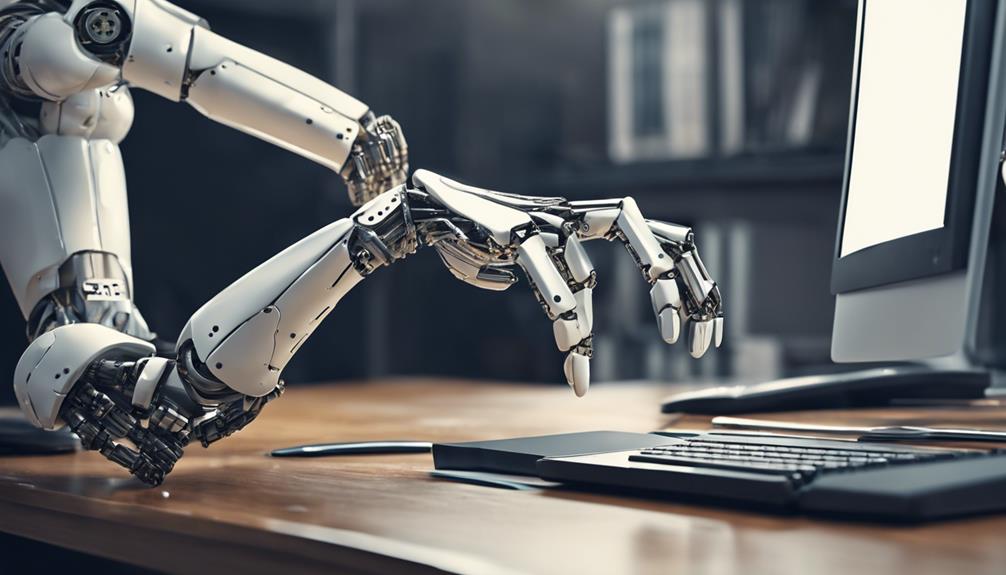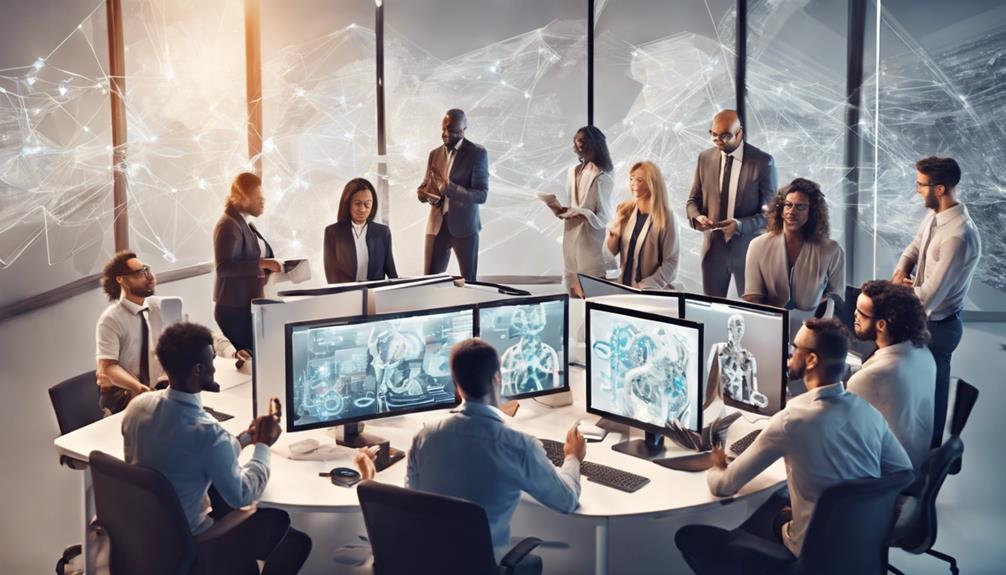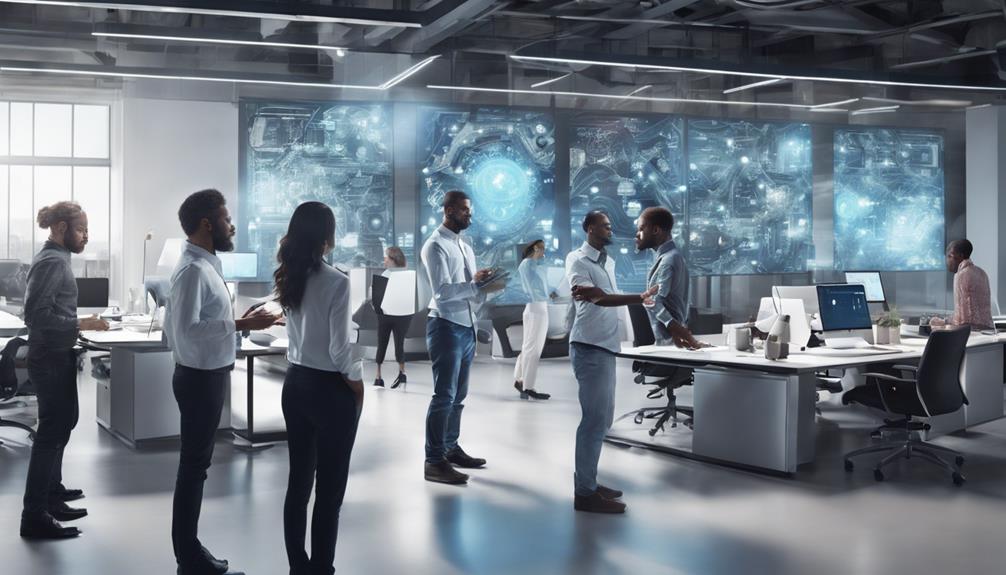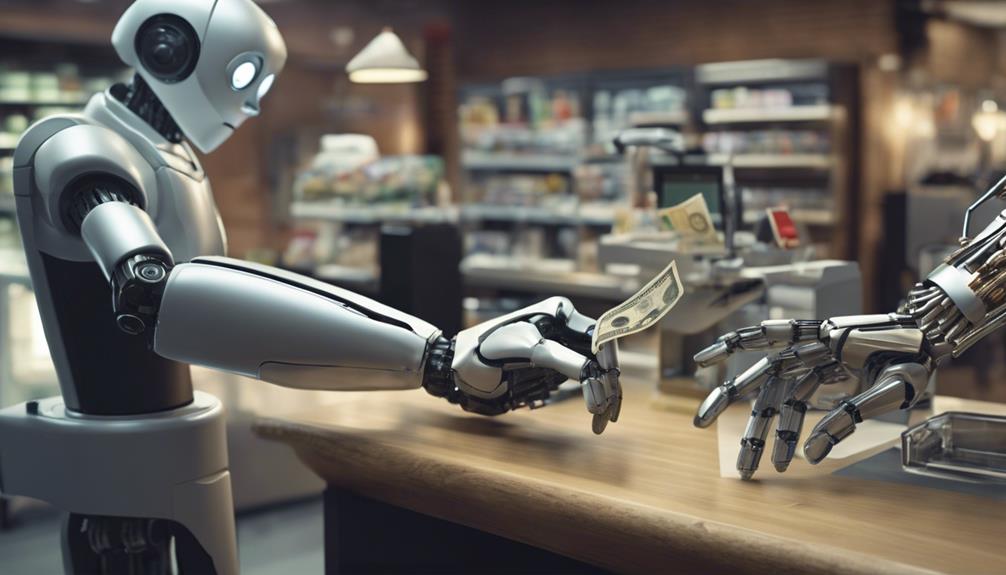In today’s ever-evolving workplace, the integration of AI in various job sectors has sparked discussions about the future of work. It is crucial for employees to adapt and stay ahead of the curve during this transformative period.
Understanding how AI is reshaping job roles and the skills that will remain in demand is essential for thriving in this new era. The convergence of human capabilities with AI technologies presents both challenges and opportunities, prompting individuals to rethink their strategies for career growth and sustainability in an increasingly automated world.
Key Takeaways
- Understand AI's impact on job market dynamics.
- Embrace continuous learning and upskilling.
- Develop human-centric skills to complement AI.
- Prepare for reshaped industries and job roles.
Impact of AI on Job Market
The proliferation of artificial intelligence (AI) is reshaping the job market landscape, with projections indicating that by 2025, 85 million jobs worldwide may be replaced by AI technologies, leading to significant disruptions in various industries.
Highly educated workers, particularly those in white-collar professions that rely on cognitive skills and creativity, are most exposed to AI automation. Occupations that are least likely to be affected by AI displacement are those requiring complex tasks and a high degree of human interaction. Workers with at least a high school diploma may find themselves in a more secure position compared to those in roles most exposed to AI.
As AI continues to advance, jobs that involve routine tasks, such as customer service representatives, drivers, programmers, analysts, and paralegals, are at high risk of automation. Adapting to these changes in the job market will require a proactive approach to upskilling and embracing roles that leverage uniquely human capabilities that AI cannot replicate.
Jobs at Risk of Automation

Navigating the evolving landscape of automation, certain occupations face imminent risk of being replaced by artificial intelligence technologies.
- Customer service representatives: Automation and chatbots are increasingly handling inquiries, potentially displacing human representatives.
- Car and truck drivers: The rise of autonomous vehicles is diminishing the need for human drivers.
- Computer programmers: Generative AI tools like ChatGPT have the potential to automate coding tasks, posing a risk to this profession.
- Research analysts: AI is becoming adept at analyzing data and generating insights, raising concerns about the future of research roles.
- Paralegals: Automation in legal processes could impact the demand for paralegals, as AI systems handle more tasks efficiently.
As technology advances, these occupations are at the forefront of potential disruption. Professionals in these fields must adapt by upskilling, embracing new technologies, and focusing on tasks that require human creativity and critical thinking to stay relevant in the ever-changing job market influenced by automation and AI integration.
Benefits of AI Integration
Embracing AI integration in the workplace revolutionizes operational dynamics, ushering in a new era of enhanced productivity and innovation. AI tools streamline processes by tackling repetitive tasks, allowing human workers to focus on tasks requiring critical thinking and creativity.
This shift in job tasks not only enhances efficiency but also paves the way for the creation of new job roles in emerging fields like machine learning and AI ethics. Human workers play a crucial role in the high exposure to AI, as they are instrumental in training, maintaining, and monitoring AI systems.
Adapting to AI in the Workplace

In the rapidly evolving landscape of the modern workplace, the adaptation to AI technologies stands as a pivotal challenge and opportunity for professionals across diverse industries. As AI continues to advance, American workers find themselves at a crossroads where jobs are at risk of automation, yet AI systems also hold the potential to enhance productivity and efficiency.
To navigate this transformation effectively, individuals must consider the following:
- Understanding the potential impact of AI on their specific roles and industries, based on research from the Pew Research Center.
- Recognizing that while AI will help streamline certain tasks, qualities that are hard for machines to replicate, such as creativity and emotional intelligence, will remain essential.
- Developing a mindset geared towards continuous learning and upskilling to adapt to the evolving demands of AI-integrated workplaces.
- Embracing the need for reskilling to take on new responsibilities that emerge due to AI, particularly in office jobs that are susceptible to automation.
- Leveraging human-centric skills like critical thinking and problem-solving to complement the capabilities of AI systems in the workplace.
Future Job Trends With AI
Projected to revolutionize the landscape of employment, Future Job Trends With AI are poised to reshape industries and job roles in unprecedented ways. As AI continues to advance, certain job categories are expected to grow while others face the risk of being replaced by AI technologies. According to the O*Net database, industries such as health, STEM, transportation, warehousing, and legal professions are anticipated to expand under the influence of AI in the U.S. labor market. Conversely, roles in office support, customer service, sales, production, and food service are among those most susceptible to automation.
| Industry | Impact of AI Acceleration |
|---|---|
| Health | Expected Growth |
| STEM | Expected Growth |
| Transportation | Expected Growth |
| Warehousing | Expected Growth |
| Legal Professions | Expected Growth |
The increasing exposure to high levels of AI among U.S. workers, approximately 20%, raises questions about the future of work and the necessary skill sets. AI's capabilities in machine vision, automation, and language processing are enabling significant shifts in job requirements, at least to a degree, especially in industries with high AI exposure like those found in New York.
Frequently Asked Questions
What Job Is Likely to Be Replaced by Ai?
As technological advancements progress, jobs involving repetitive tasks, data processing, and basic analysis are at risk of being replaced by AI. Professionals in customer service, driving, programming, research analysis, and paralegal roles should prepare for potential shifts in their industries.
What Will Happen to Jobs if AI Takes Over?
As AI advances, jobs may shift to more specialized roles, and human efforts may align with higher-level tasks. The transformative impact of AI on jobs could usher in a new era of job creation and require adaptive skill sets.
Which Jobs AI Will Not Replace?
Professions requiring complex tasks, human interaction, creativity, physical skills, manual labor, empathy, and specialized human expertise are less likely to be replaced by AI. These roles emphasize the irreplaceable value of human ingenuity and skill in the workforce.
What Does Elon Musk Think of Ai?
Elon Musk views AI as a potential threat to humanity due to its ability to surpass human intelligence. He emphasizes the importance of proactive regulation to prevent uncontrolled development and advocates for responsible AI management to harness its benefits ethically.
Conclusion
In the ever-evolving landscape of work, embracing AI as a tool for enhancement rather than replacement is key.
Just as a sculptor molds clay into a masterpiece, professionals must shape their skills and adapt to the changing demands of the job market.
By staying ahead of the curve and leveraging AI technologies, individuals can carve out new opportunities and thrive in a future where innovation and automation go hand in hand.









